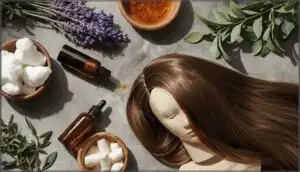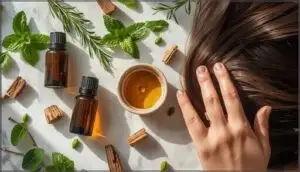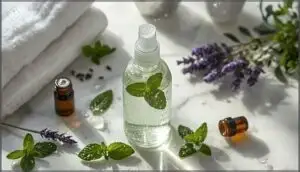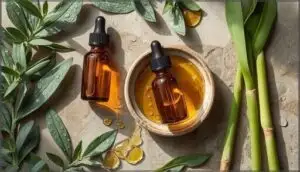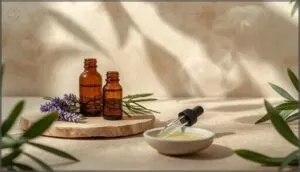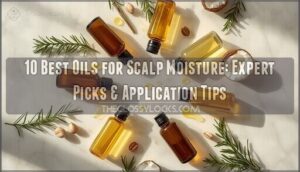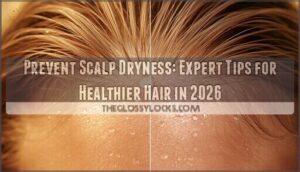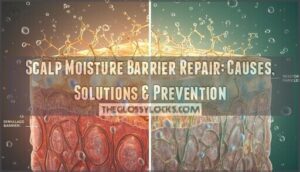This site is supported by our readers. We may earn a commission, at no cost to you, if you purchase through links.

These aren’t just pleasant-smelling additions to your hair routine—essential oils pack antimicrobial and anti-inflammatory properties that target the root causes of scalp problems. From boosting blood flow to balancing oil production, the right botanical blends create an environment where your scalp can actually thrive instead of just survive.
Table Of Contents
- Key Takeaways
- Essential Oils Benefits for Scalp Health
- Top 9 Essential Oils and Products for Healthy Scalp
- 1. Rosemary Mint Hair Oil Treatment
- 2. Tea Tree Oil Hair Growth
- 3. Cedarwood Essential Oil for Skin
- 4. Organic Rosemary Oil for Hair
- 5. Plantovika Rosemary Hair Growth Oil
- 6. Vitality Extracts Healthy Scalp Oil
- 7. Ghori Rosemary Mint Biotin Hair Oil
- 8. Pure Rosemary Essential Oil 4oz
- 9. Vitality Extracts Healthy Hair Oil
- How to Use Essential Oils in Scalp Care
- DIY Essential Oil Recipes for Scalp Health
- Safety Tips for Using Essential Oils on Scalp
- Frequently Asked Questions (FAQs)
- Conclusion
Key Takeaways
- Clinical research shows tea tree oil cuts dandruff by 41% and rosemary extract blocks over 70% of inflammatory compounds, making these essential oils powerful, evidence-based treatments for scalp conditions like flaking, fungal overgrowth, and inflammation.
- Essential oils improve scalp health through four key mechanisms: antimicrobial action against pathogens, increased blood flow to stimulate dormant follicles, sebum regulation to balance oil production, and anti-inflammatory compounds that soothe irritation and itchiness.
- Proper dilution with carrier oils (2-3 drops per tablespoon) is non-negotiable for safety—undiluted essential oils can cause skin irritation, burning, or allergic reactions in up to 85% of people who experience adverse effects.
- Results take consistent use over 2-4 weeks to become noticeable, with rosemary oil showing 18.9-47% hair growth improvements in clinical trials when applied 2-3 times weekly, making patience and routine application critical for real outcomes.
Essential Oils Benefits for Scalp Health
Your scalp is more than just the foundation for great hair—it’s a complex ecosystem that needs the right kind of care. Essential oils bring powerful plant-based compounds to the table, targeting everything from stubborn fungal issues to sluggish circulation.
Let’s break down the four key ways these oils can transform your scalp health and get your hair growing strong.
Antimicrobial and Anti-Inflammatory Properties
When you’re treating scalp conditions, essential oils pack a one-two punch against microbial pathogens and inflammation mechanisms. Tea tree oil’s antimicrobial properties reduced dandruff by 41.2% in clinical trials, while rosemary extract inhibited over 70% of nitric oxide production—key bioactive compounds that tackle both fungal overgrowth and inflammatory responses.
These oils contain complex compounds, and research is still minimal on their effects. Combined outcomes show these anti-inflammatory properties working together: botanical scalp oils achieved 87.1% quality-of-life improvements within two weeks, proving their comparative efficacy for scalp health.
Improving Blood Flow and Stimulating Follicles
Beyond fighting off microbes, certain essential oils improve blood flow to your scalp—and that’s where follicle stimulation really takes off. Peppermint oil (3%) boosted dermal thickness and follicle depth after just four weeks, while rosemary oil enhanced vascular function and scalp perfusion enough to match minoxidil’s results in some trials.
When you massage these oils into your scalp, you’re increasing nutrient delivery and triggering follicle activation, which kicks dormant hair follicles into growth mode and aids stimulating hair growth. Rosemary oil’s benefits include potential anti-androgenic properties.
Balancing Oil Production and Reducing Dandruff
That circulation boost naturally leads to better sebum regulation—your scalp’s oil thermostat. Tea tree and lavender oils tackle fungal control by clearing Malassezia yeast, the main culprit behind flaking.
Here’s how essential oils rebalance your scalp health:
- Tea tree oil reduces dandruff by fighting fungal overgrowth
- Lavender oil normalizes sebum production without stripping
- Lemongrass clears product buildup that clogs follicles
- Clary sage balances oil while reducing scalp inflammation
- Rosemary decreases excess oil and delivers itch relief
Balancing oil production means fewer greasy roots and less flaking—essential oils work both ends of the spectrum.
Soothing Scalp Irritation and Itchiness
When flaking eases up, you’ll notice another shift—persistent scalp irritation and that maddening itchiness finally calming down. Essential oils with anti-inflammatory compounds like lavender and peppermint deliver cooling sensations and long-term relief.
Mix with carrier oils for gentle application methods. Identifying triggers like product sensitivity helps you target the root cause of your itchy scalp while soothing scalp irritation effectively.
Top 9 Essential Oils and Products for Healthy Scalp
Now that you know which essential oils pack the biggest punch for scalp health, let’s look at some standout products you can actually buy.
I’ve rounded up nine formulas that blend these powerhouse oils into ready-to-use treatments. Each one targets specific scalp concerns, from stubborn flakes to sluggish follicles.
1. Rosemary Mint Hair Oil Treatment
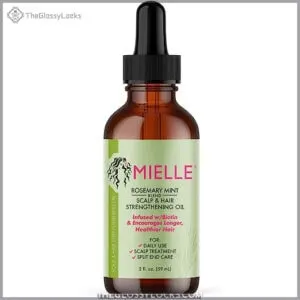
Your scalp’s health depends on consistent circulation and nutrient delivery—that’s where rosemary oil and peppermint oil work together. This award-winning, nutrient-rich formula combines biotin with mint and rosemary oil to boost scalp invigoration, increasing blood flow directly to your follicles during scalp massage.
The scent profile balances herbal rosemary with invigorating mint, though some find it strong. Application tips: use sparingly—just a few drops—to avoid oily residue, especially if you have fine hair.
With regular pre-wash treatments, you’ll notice long-term results: stronger strands, reduced shedding, and improved scalp health that promotes hair growth naturally.
Best For: Anyone dealing with dry scalp, thinning hair, or looking to boost circulation and strengthen strands through consistent scalp care routines.
- Nutrient-rich formula with biotin and rosemary oil increases blood flow to follicles, promoting stronger hair growth and reducing shedding over time
- Works across all hair types and textures as a versatile pre-wash treatment or scalp massage oil
- Award-winning, paraben-free formula in a convenient glass dropper bottle for precise application
- Can feel greasy on fine or low-porosity hair if you use too much—requires careful dosing
- Results take consistent use over weeks to become noticeable, not an instant fix
- Strong rosemary-mint scent may be overpowering for some users, and could irritate sensitive skin
2. Tea Tree Oil Hair Growth
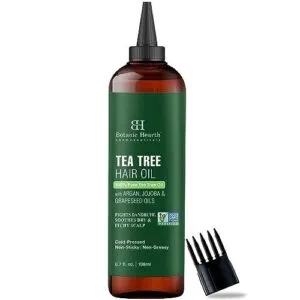
Fungal overgrowth is one of the most common culprits behind stubborn scalp issues—and that’s where tea tree oil shines. Studies show its antimicrobial properties can tackle dandruff and follicle-clogging buildup that slows hair growth.
For alopecia benefits, you’ll want to dilute it properly: mix 3-5 drops with a carrier oil like jojoba or sweet almond oil before applying. This product combines tea tree oil with argan and grape seed oils to soothe itchy scalp while creating a balanced environment for growth.
At $14.95 for 6.7 ounces, it’s budget-friendly—just watch for greasiness if you over-apply.
Best For: Anyone dealing with dandruff, itchy scalp, or slow hair growth who wants an affordable, natural solution that won’t break the bank.
- Contains tea tree oil plus argan, jojoba, and grape seed oils to soothe irritation and support a healthy scalp environment for growth
- Budget-friendly at $14.95 for 6.7 ounces, making it accessible for regular use
- Cruelty-free and ethically sourced, ideal for conscious consumers
- Strong tea tree scent isn’t for everyone and may be overpowering
- Can leave hair feeling greasy if you use too much or don’t wash it out thoroughly
- Some bottles have quality control issues with pinhole leaks at the bottom
3. Cedarwood Essential Oil for Skin
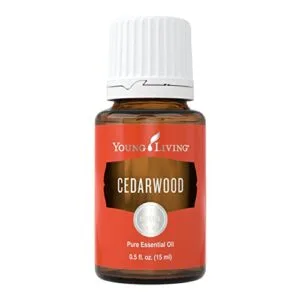
Antioxidant effects make cedarwood essential oil a standout for more than just acne treatment—it addresses scalp health from multiple angles.
This oil fights bacteria and fungi that clog hair follicles while calming dermatitis relief needs with its anti-inflammatory compounds. If you’re dealing with oily skin or excess sebum production, cedarwood’s astringent properties help restore balance without stripping moisture.
Young Living’s 15ml bottle ($19.17) delivers pure cedarwood oil that’s gained traction in market trends for sustainable beauty.
Dilute it properly—studies show concentrations below 20% work safely for most users—then massage into your scalp to activate its antimicrobial power.
Best For: People looking for a natural solution to scalp issues, oily skin, or hair health concerns who want a multi-functional essential oil backed by antimicrobial and antioxidant properties.
- Strong antimicrobial action fights bacteria and fungi that cause scalp problems, with proven effectiveness against common pathogens at low concentrations
- Powerful antioxidant properties (up to 81.1% activity) protect skin from oxidative stress while soothing inflammation from acne and dermatitis
- Affordable at $19.17 for 15ml of pure oil that works for multiple uses—scalp treatments, skin balancing, and DIY beauty projects
- Requires proper dilution before use since full-strength application can cause moderate skin irritation and concentrations above 50% may trigger adverse reactions
- Limited clinical evidence for some benefits, with most research based on laboratory studies rather than large-scale human trials
- Can be overpowering if overused, and individual results may vary depending on skin type and sensitivity levels
4. Organic Rosemary Oil for Hair
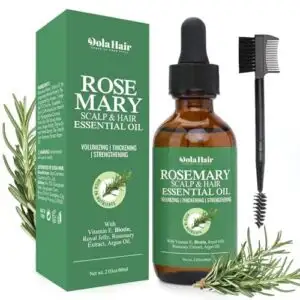
A 2015 trial revealed rosemary oil matched minoxidil’s hair growth results—but with less itching. That synthetic treatment comparison shows you don’t need pharmaceutical options to stimulate follicles effectively.
Rosemary essential oil works through bioactive compound mechanisms: rosmarinic acid and camphor boost scalp health by increasing blood circulation and fighting oxidative stress.
Market growth trends confirm its popularity—the rosemary hair care sector hit $980.8 million in 2023.
When using rosemary oil for hair growth, follow application safety guidelines: dilute to 2% concentration in jojoba or coconut carrier oil to prevent irritation while maximizing follicle stimulation.
Best For: Anyone dealing with hair loss, thinning hair, or scalp issues who wants a natural alternative to synthetic treatments like minoxidil.
- Clinically proven to match minoxidil’s effectiveness in promoting hair growth while causing less scalp irritation and itching.
- Contains multiple active compounds (rosmarinic acid, camphor, ursolic acid) that work together to boost circulation, reduce inflammation, and strengthen hair from the roots.
- Affordable at $6.99 for 2.03 fluid ounces and works for all hair types, plus offers additional benefits like fighting dandruff and moisturizing skin.
- Requires proper dilution to 2% concentration with a carrier oil to avoid irritation, which adds an extra step to your routine.
- Some users report an overpowering or perfume-like mint scent that may not appeal to everyone.
- Ingredients list may not match organic claims or expectations, with rosemary sometimes not listed as the primary ingredient despite marketing.
5. Plantovika Rosemary Hair Growth Oil
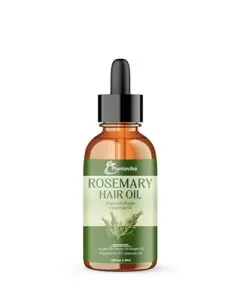
Plantovika’s Oil Blend delivers rosemary, jojoba, castor, argan, peppermint, and lavender—six essential oils targeting hair follicles from multiple angles.
Clinical Trials show rosemary oil achieving 18.9% hair count increases, and this formula utilizes those Consumer Trends driving 64% of buyers toward natural solutions.
The Usage Regimen is straightforward: apply daily as a finishing oil or 1–2 times weekly pre-wash to stimulate hair growth while improving scalp health.
Its Safety Profile checks out—vegan, paraben-free, and well-tolerated, though the strong scent catches some users off guard initially.
Best For: Anyone dealing with thinning hair or slow growth who wants a natural, multi-oil formula that’s gentler on the scalp than chemical treatments.
- Clinical backing shows rosemary oil performs comparably to minoxidil with 18.9% hair count increases after consistent use
- Works across all hair types and doubles as a daily finisher or weekly pre-wash treatment for flexibility
- Vegan, cruelty-free formula free of sulfates and parabens, with less scalp irritation than minoxidil in trials
- Strong scent on initial application that some users find off-putting
- Very oily texture means you need to use sparingly or risk greasy hair
- Packaging issues reported by 14% of users, including leaks during shipping
6. Vitality Extracts Healthy Scalp Oil
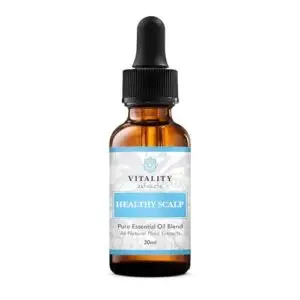
Vitality Extracts Healthy Scalp Oil combines jojoba, castor, rosemary, tea tree, eucalyptus, and avocado oils—an essential oil blend designed to tackle scalp conditions from dryness to dandruff.
Ingredient Analysis reveals jojoba’s sebum-mimicking properties and tea tree’s 41% dandruff reduction in clinical efficacy studies, while rosemary matches minoxidil’s growth results over six months.
The formulation quality stands out: GC/MS testing confirms purity, amber glass protects potency, and zero parabens or sulfates guarantee consumer safety.
Brand reputation tells a mixed story—11 years in business but an F rating from unresolved complaints. Still, users report improved hair care outcomes: softer strands, calmer scalps, and better manageability when improving scalp health consistently.
Best For: Those dealing with scalp dryness, dandruff, or thinning hair who want a clean, plant-based oil blend with clinically-backed ingredients like rosemary and tea tree.
- Contains research-supported ingredients like rosemary oil (comparable to minoxidil in studies) and tea tree oil (41% dandruff reduction in trials)
- Clean formulation with GC/MS testing, no parabens or sulfates, and amber glass packaging to preserve ingredient potency
- Works across all hair types with users reporting softer hair, reduced scalp irritation, and improved manageability
- Small 30ml bottle may run out quickly with regular use, making it less cost-effective long-term
- Vitality Extracts has an F rating from the BBB due to unresolved customer service complaints
- Results vary—some users report no improvement or even worsening hair loss despite the quality ingredients
7. Ghori Rosemary Mint Biotin Hair Oil
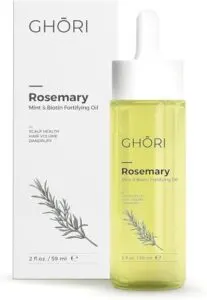
Ghori Rosemary Mint Biotin Hair Oil brings together rosemary oil efficacy with mint scalp soothing and biotin hair benefits in one lightweight formula.
You’ll find rosemary working at minoxidil levels to stimulate hair follicles, while peppermint cools irritation and biotin strengthens each strand from root to tip.
Apply a few drops during your scalp massage 2–3 times weekly, leave it in overnight, then rinse—users report fuller hairlines within weeks.
This paraben-free blend fits any hair care routine, whether you’re dealing with thinness or just want stronger hair growth stimulation without the grease.
Best For: Anyone looking for a natural, clinically-backed hair oil to boost growth, reduce shedding, and soothe scalp irritation without harsh chemicals.
- Rosemary oil matches minoxidil 2% effectiveness in clinical trials, delivering real growth results with biotin and mint for stronger, fuller hair.
- Fast-absorbing and lightweight formula works on all hair types, won’t clog pores or leave greasy residue, and safe for color-treated hair.
- Soothes dry, itchy scalps with peppermint’s cooling effect while castor and safflower oils fight dandruff and breakage.
- Strong rosemary-mint scent may be overpowering for users sensitive to botanical fragrances.
- Results take weeks to months of consistent use—not an overnight fix for thinning or hair loss.
- Can look oily if you overdo it, and packaging quality issues during shipping have been reported by some buyers.
8. Pure Rosemary Essential Oil 4oz
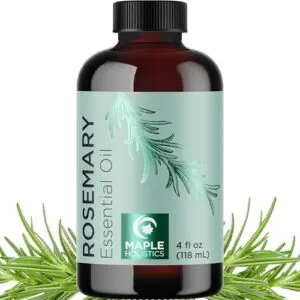
Pure Rosemary Essential Oil 4oz from Maple Holistics gives you undiluted power at $22.95—no fillers, just concentrated rosemary ready for your custom blends.
Studies show rosemary oil boosts hair growth by 47–57% in 90 days, thickens strands by 66%, and cuts hair fall over 40%.
Mix 5 drops per teaspoon of jojoba or coconut oil for scalp massage, patch-test first, then apply 2–3 times weekly. This 4oz bottle lasts months and works in diffusers too.
Remember: pure means potent, so dilution best practices aren’t optional—they’re your safety net against irritation.
Best For: Anyone seeking a science-backed, concentrated hair growth treatment who’s comfortable diluting essential oils and wants a multi-use product for scalp health, aromatherapy, or skincare.
- Clinical evidence shows 47–57% hair growth improvement, 66% thickness increase, and 40% reduction in hair fall within 90 days
- Pure, undiluted formula means you control dilution ratios and one 4oz bottle lasts months with proper use
- Triple-threat benefits: antimicrobial action against scalp pathogens, antioxidant protection, and works in diffusers for aromatherapy
- Requires dilution knowledge and carrier oils before use—applying it straight can cause irritation
- Some users report packaging issues like broken seals or stained bottles upon arrival
- Not suitable for everyone; patch testing is necessary and those with plant oil allergies should avoid it
9. Vitality Extracts Healthy Hair Oil
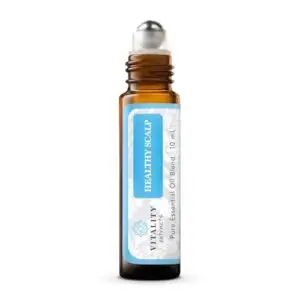
Vitality Extracts Healthy Hair Oil blends amla, bhringaraj, brahmi, sesame, turmeric, peppermint, and chili seed oil into one Ayurvedic-inspired formula priced at $24.95 for 0.34 ounces.
Clinical evidence shows similar herbal oil blends increase hair density by 10.1% after 168 days, while 80% of users report visible thickness improvements. User reviews average 2.09 stars—some praise reduced breakage and better scalp comfort, others flag inconsistent texture.
The safety profile looks solid with proper dilution; patch-test first since peppermint and chili can irritate sensitive scalps. It’s vegan, cruelty-free, and works across all hair types in your hair care routine, whether you’re tackling thinning strands or just boosting scalp massage benefits.
Best For: Anyone dealing with thinning hair, scalp irritation, or who wants an Ayurvedic oil blend to boost hair density and follicle health.
- Clinical data shows 10.1% increase in hair density after 168 days, with 80% of users reporting visible thickness improvements
- Vegan, cruelty-free formula with no parabens, sulfates, or synthetic additives—suitable for all hair types including gray, colored, or damaged hair
- Combines antimicrobial and anti-inflammatory botanicals (lavender, neem, amla) that reduce dandruff, scalp itching, and irritation
- Mixed user reviews averaging 2.09 stars cite inconsistent texture and scent longevity issues
- Small 0.34-ounce bottle at $24.95 may not last long for regular use
- Peppermint and chili seed oil can irritate sensitive scalps—patch testing is required before full application
How to Use Essential Oils in Scalp Care
You’ve got the oils—now let’s talk about getting them onto your scalp where they can actually do their job. Essential oils work best when you use them consistently and pair them with the right methods.
Here are four practical ways to weave these scalp-boosting ingredients into your routine.
Scalp Massages and Pre-Shampoo Treatments
Think of a scalp massage with essential oils as a wake-up call for lazy follicles—you’re basically kneading life back into your scalp while feeding it exactly what it needs to stop the shedding cycle.
Mix 3-4 drops of essential oils into a carrier oil, then use firm circular massage techniques for 5-10 minutes before shampooing.
This treatment duration allows proper oil absorption while boosting scalp stimulation and buildup removal, setting the stage for healthier hair care habits.
Adding Oils to Shampoo and Conditioner
If you want your everyday shampoo and conditioner to pull double duty on scalp health, adding essential oils directly into the bottle transforms them into targeted treatments without extra steps.
Start with shampoo ratios of 10-12 drops per 8 oz bottle—this keeps oil interactions balanced without overwhelming your hair products. For conditioner types that already moisturize, stick to 6-8 drops since you’re incorporating oils into routine application tips that focus on frequency usage of 2-3 times weekly for best essential oil benefits without buildup.
Creating Post-Wash Scalp Tonics
After you rinse out your conditioner, a targeted scalp tonic can deliver concentrated essential oils right where your follicles need them most—without weighing down your clean hair.
Mix 3-5 drops of essential oil blends with a carrier oil or hydrosols in a spray bottle for easy tonic application methods. The ingredient synergy between rosemary and peppermint works especially well for circulation.
Apply 2-3 times weekly after washing, store in cool, dark places following storage guidelines, and your scalp tonic frequency promotes ideal hair care results.
DIY Hair Masks and Scalp Scrubs
Weekly scalp scrubs and deep-conditioning masks give you a chance to tackle stubborn buildup and deliver therapeutic essential oils deeper into your follicles than everyday products can reach. Here are five DIY hair treatments to try:
- Sugar scrub with tea tree oil in jojoba carrier oil removes flakes
- Clay mask blended with rosemary essential oil draws out impurities
- Honey-avocado hair mask mixed with lavender nourishes dry scalps
- Coffee grounds scrub plus peppermint boosts circulation
- Coconut oil treatment with cedarwood balances sebum production
Store homemade recipes in dark glass containers and customize ingredient selection based on your scalp’s needs.
DIY Essential Oil Recipes for Scalp Health
Now that you know how to work essential oils into your routine, let’s get hands-on with some recipes you can make at home.
These blends target specific scalp concerns using the oils we’ve covered, and they’re simple enough to whip up in your kitchen.
Each recipe below tackles a different hair or scalp issue, so pick the one that matches what you’re dealing with right now.
Stimulating Hair Growth Blend
Your hair follicles need the right blend synergy to wake up and grow. Mix 3 drops rosemary oil, 2 drops peppermint oil, and 1 drop cedarwood essential oil into 2 tablespoons jojoba carrier oil—that’s ideal dilution for scalp sensitivity.
Massage the mixture directly onto your scalp using circular application methods twice weekly.
Consistent long-term effects include thicker strands and reduced shedding as these oil blends stimulate circulation, promoting healthy hair growth from the root.
Anti-Dandruff Oil Mixture
Flakes aren’t just embarrassing—they’re often a red flag that fungal overgrowth or product buildup is choking your follicles.
Combat dandruff with this targeted blend:
- 4 drops tea tree oil (powerful antifungal tea tree benefits)
- 2 drops lavender oil (calms inflammation)
- 2 drops rosemary oil (rosemary synergy clears flakes)
- 2 tablespoons sweet almond carrier oil (safe dilution)
- Apply three times weekly, or try overnight treatment for stubborn scalp conditions
Soothing Scalp Tonic for Irritation
If your scalp feels like it’s throwing a tantrum—tight, red, and impossible to ignore—you need a cooling tonic that works fast. Mix 3 drops of peppermint oil, 2 drops of lavender oil, and 1 tablespoon of witch hazel with 4 tablespoons of distilled water. Spray directly onto irritated areas after washing—these cooling agent options calm skin inflammation instantly, while anti-inflammatory essential oils tackle soothing scalp conditions at the root.
| Ingredient | Purpose | Storage Tip |
|---|---|---|
| Peppermint oil | Cools irritation | Refrigerate for 2 weeks |
| Lavender oil | Reduces redness | Store in a dark glass bottle |
| Witch hazel | Soothes inflammation | Keep at room temperature |
Balancing Oil Production Recipe
An oily scalp isn’t a lost cause—it just needs the right blend to hit the reset button without stripping everything dry.
Combine 3 drops clary sage oil, 2 drops lemongrass oil, and 1 tablespoon jojoba oil—massage into your scalp twice weekly before shampooing.
This blend regulates sebum production without overdrying, storing up to 3 weeks in amber glass. You’ll notice less grease and more balanced hair within 10 days.
Safety Tips for Using Essential Oils on Scalp
Essential oils are powerful extracts that need careful use to keep your scalp safe and healthy. Before you start mixing your own blends, you’ll want to know how to dilute them properly, spot any red flags, and pick the right carrier oils for your hair type.
Here’s what you need to keep in mind to avoid irritation and get the best results.
Proper Dilution With Carrier Oils
Before you drip a single drop of essential oil onto your scalp, you need to understand that dilution isn’t optional—it’s the difference between nourishing your follicles and burning your skin.
Using essential oils safely means following proper dilution ratios: usually 2-3 drops per tablespoon of carrier oil for sensitivity testing. Choose carrier oils like jojoba or sweet almond based on their carrier properties, and always store your blends in dark glass bottles to preserve potency.
Recognizing Potential Side Effects
Even though you’ve diluted properly, you’re not out of the woods yet—skin irritation is the most common complaint when using essential oils for scalp health, with burning or itching affecting up to 85% of people who experience reactions. Watch for these warning signs:
- Allergic reactions like redness, swelling, or blistering (especially if you’re fragrance-sensitive)
- Hormonal effects from oils like lavender, which can disrupt endocrine function with prolonged use
- Follicular clogging leading to inflammation, hair thinning, or folliculitis if oils are too heavy
- Sensitization risks that develop over time, making you reactive even to oils you previously tolerated
Women aged 40-59 face the highest risk, and preexisting scalp conditions increase your vulnerability to complications.
Choosing The Right Carrier Oils
Your carrier oil isn’t just a diluting agent—it’s the vehicle that determines how well those essential oils penetrate your scalp and how long they stay active without causing trouble.
Match your base oil to your hair porosity: jojoba oil mimics sebum for balanced absorption, coconut oil penetrates deeply but has higher comedogenic ratings (watch for clogged follicles), while olive oil suits dry scalps but oxidizes faster—check shelf life and scent profiles before committing.
Frequently Asked Questions (FAQs)
How long before seeing scalp health improvements?
Most people notice subtle shifts within two to four weeks of Consistent Application, though Individual Variance plays a big role.
Oil Absorption and Lifestyle Factors affect timing, so keep Realistic Expectations while monitoring scalp health improvement.
Which essential oils suit sensitive skin best?
Lavender oil and chamomile oil are top picks—both are gentle essential oils with antiinflammatory properties that soothe without triggering skin irritation.
Always do patch testing and proper dilution for sensitivity before full application.
Are essential oils safe during pregnancy or breastfeeding?
Most essential oils aren’t recommended during pregnancy or breastfeeding without doctor consultation. Certain compounds can affect fetal development or transfer through breast milk.
If your healthcare provider approves using essential oils, stick to safe oils at proper dilution ratios to minimize skin irritation risks.
Can essential oils replace prescription scalp treatments?
No, essential oils can’t replace prescription treatments. They lack prescription strength efficacy for severe scalp conditions and may cause potential drug interactions.
While essential oils offer antifungal and antiinflammatory properties for scalp health improvement, always seek professional medical advice before stopping prescribed medications.
Conclusion
Think of your scalp like soil in a garden—when the pH goes off or drainage clogs up, nothing thrives. Essential oils for a healthy scalp work the same way: they restore balance, fight off invaders, and create conditions where follicles can actually flourish.
You’ve got the science-backed formulas and DIY recipes now. Dilute properly, patch-test first, and give your scalp the targeted care it’s been asking for. Those flakes and that itch? They don’t stand a chance.

